How to Fix French Bulldog Potty Training Issues
French Bulldogs, also known as Frenchies, are excellent companions thanks to their gentle nature and irresistibly cute looks. Training a French Bulldog to use the toilet can be quite a task for individuals new to caring for Frenchie puppies.
To effectively establish good habits and maintain a clean and organised home, toilet training is crucial.
I can offer some guidance if you’re interested in potty training a French Bulldog, regardless of their age. This detailed guide will systematically cover frequently asked questions and practical suggestions for tackling obstacles.
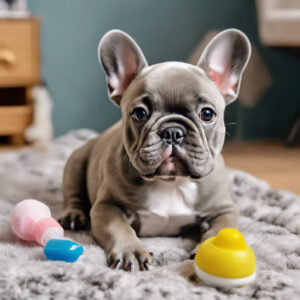 Understanding Your French Bulldog’s Needs
Understanding Your French Bulldog’s Needs
Understanding your puppy’s needs is crucial before starting the toilet training journey with your French Bulldog.
Because of their small bladders, French Bulldog puppies must urinate often, especially if they are younger than 12 weeks old.
Creating a consistent bathroom routine for your Frenchie can be pretty beneficial, whether you designate a specific spot in your yard or use a puppy pad.
French Bulldogs are well known for their obedience, although they may sometimes exhibit a bit of defiance.
Consistency and positive reinforcement are crucial when teaching your pet to use the restroom.
Practice patience when your dog has accidents, and rejoice in their successes.
It’s important to remember that each puppy’s progress can differ. Ensuring a positive interaction will help foster a stronger bond between you and your Frenchie.
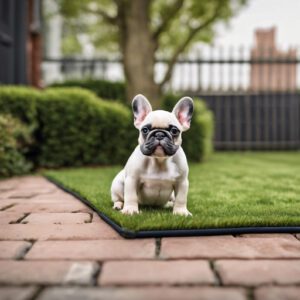 Establishing a Consistent Potty Training Routine
Establishing a Consistent Potty Training Routine
Establishing a consistent schedule is crucial to ensure successful toilet training.
It is advisable to take your French Bulldog puppy outside for bathroom breaks every two to three hours after meals, naps, and playtime.
Consistently using a specific command, such as “Go potty,” and having a designated area can help teach your puppy to associate the command with the desired behaviour.
Creating and sticking to a consistent schedule is the most effective method for managing your puppy’s bathroom needs.
Create a consistent schedule for feeding and keep track of your Frenchie’s bathroom patterns to identify any recurring patterns.
Teaching your dog to associate specific times and places with going potty will significantly improve their toilet training experience.
Choosing the Right Potty Training Method
Use puppy pads, a designated box, or a specific outdoor spot to potty train your French Bulldog.
The best approach will depend on your dog’s needs and the environment you live in.
Puppy pads can be helpful if you have limited space to walk your dog outside, like in an apartment.
Gradually transition your Frenchie to outdoor potty breaks to avoid confusion and help them develop good habits as they grow older.
Another option for toilet training is using a potty box lined with grass or recycled newspapers.
Creating a designated outdoor toilet area in your yard is highly recommended if you can access one easily.
Consistency is vital when taking your Frenchie out for a potty break. Make sure always to bring him to the designated spot.
Using positive reinforcement strategies such as praise and food can be highly effective in teaching your pet to use the toilet in the correct spot.
Addressing Common Potty Training Setbacks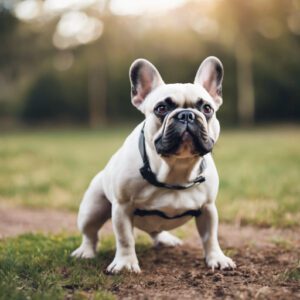
Regrettably, accidents happen, regardless of how cautious one may be.
One common issue is that French Bulldogs may have accidents in undesirable locations, such as carpets or furniture.
If you want to ensure that your dog doesn’t return to the same spot, thoroughly clean the area with an enzymatic cleanser.
Consistency is crucial when it comes to handling obstacles during toilet training.
Make sure your Frenchie adheres to the planned schedule and receives rewards for using the toilet in the designated area.
If you’re looking for expert guidance and support, it might be worth considering the help of a professional dog trainer. They can provide personalised advice and assistance to address any ongoing issues you may be facing.
Positive Reinforcement Techniques
Positive reinforcement is the most effective way to toilet-train a French Bulldog.
Once your cherished pet successfully uses the toilet in the designated area, show them affection, commendation, and treats.
Implementing this approach will help them develop a positive association with the desired behaviour, increasing the likelihood of repeating it.
Being punctual and consistent is crucial when using positive reinforcement tactics.
To achieve practical potty training, it is crucial to have treats on hand and be ready to reward your Frenchie when they use the designated area promptly.
Through consistent training and positive reinforcement, it is possible to gradually reduce your pet’s reliance on treats while effectively reinforcing good behaviour.
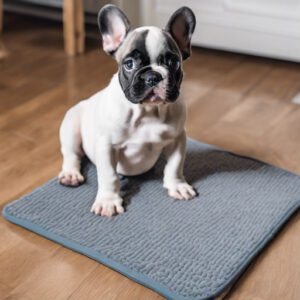 Common Signs Your French Bulldog Needs to Go Potty
Common Signs Your French Bulldog Needs to Go Potty
To effectively teach your French Bulldog to use the restroom, it is essential to develop an understanding of the cues your dog displays, both in terms of their physical and behavioural indicators. Here are some common indicators:
- Engaging in behaviours such as sniffing the ground or circling a specific area
- Whining, barking, or scratching at the door
- Restlessness or sudden changes in behaviour
- Assuming a potty position by squatting
When you notice these behaviours, it’s essential to promptly guide your Frenchie to their designated bathroom spot and use your preferred toilet command.
Through consistent and dedicated training, your furry companion will learn to communicate their needs, allowing you to save valuable time and energy.
Addressing Accidents and Setbacks
Mistakes are bound to happen during potty training a puppy, especially if it is still young.
Stay calm and avoid scolding your French Bulldog if it has an accident indoors. Employ an enzymatic cleanser to eliminate lingering odours that may attract your dog to revisit the same spot.
Urinary tract infections and anxiety can sometimes be factors impacting your Frenchie’s potty training progress or frequency of accidents.
Visit your vet to ensure your dog’s health. If you need additional assistance, consider hiring a professional dog trainer.
Trending FAQs:
How much time does it usually take to potty train a French Bulldog?
The duration of potty training can vary depending on factors such as the dog’s age, temperament, and consistency. It can range from a few weeks to several months.
Is crate training essential for potty training?
Crate training is a practical approach to potty training, as it allows for better supervision and helps prevent accidents when you are unable to monitor your puppy actively. However, other methods can be considered, depending on personal preferences.
Are French Bulldogs difficult to potty train?
French Bulldogs are known for their intelligence and willingness to please, which makes them a breed that is generally easy to train. However, every dog is unique; some may need extra time and patience.
Is it acceptable to utilise puppy pads for potty training?
Puppy pads can be used as a temporary solution or a helpful tool during the transition period. It is recommended to gradually transition your French Bulldog to outside potty breaks to prevent them from becoming too dependent on indoor pads.
What are some practical ways to discourage marking behaviour?
Neutering your male French Bulldog can significantly diminish or even eliminate marking behaviour. In addition, consistent supervision, frequent potty breaks, and redirecting your dog to the designated area are essential to discourage marking tendencies.
Comparison of Potty Training Methods for French Bulldogs
| Training Method | Pros | Cons | Ideal Living Situation | Necessary Equipment | Key Steps |
|---|---|---|---|---|---|
| Crate Training | It helps prevent accidents inside; dogs avoid soiling their sleeping area | Requires crate introduction and positive association, not suitable for long periods | Homes where the owner can supervise and let the dog out frequently | Appropriate-sized crates, treats, and praise | Introduce the crate gradually, use it for short periods, and take it out immediately after release. |
| Outdoor Training | Ideal for dogs with access to a yard or designated outdoor space, it encourages outdoor potty habits. | Needs consistent access to the outdoors, weather-dependent | Homes with easy outdoor access, yards, or frequent outdoor trips | Designated outdoor potty area, treats, and praise | Take to designated spot consistently, use the specific potty command, and reward immediately. |
| Paper Training | Useful for apartment living or limited outdoor access, can transition to outdoor training later | It can confuse dogs if not transitioned to outdoor training; pads need regular changing. | Apartments or homes without immediate outdoor access | Puppy pads, treats, and praise | Place pads in a consistent spot, gradually move pads towards the door and transition to outdoors. |
This comparison provides a comprehensive overview of each potty training method’s advantages, disadvantages, suitable living conditions, essential equipment, and necessary steps.
Approaching the task with expertise, dedication, and ample patience is crucial when potty training an adult French Bulldog or Frenchie puppy.
Successfully potty training your French Bulldog involves understanding its unique needs, establishing a consistent schedule, choosing the proper training method, and using positive reinforcement techniques.
It’s important to remember that every dog progresses at their own pace.
Maintaining a patient and encouraging attitude when your French Bulldog faces challenges and celebrating their successes is essential.
With proper training, your Frenchie will become accustomed to using the toilet in its designated area, allowing you to enjoy a clean and peaceful home.
Establishing a strong bond with your French Bulldog involves the critical task of potty training.
By consistently showing love and attention and providing consistent training, you can ensure a long-lasting bond with your loyal and well-behaved furry friend. Have a great time during your training!
Sources:
1. “French Bulldog Training.” American Kennel Club. [https://www.akc.org/dog-breeds/french-bulldog/training/]
2. “French Bulldog Care Guide: Training Your French Bulldog.” French Bulldog Club of America. [https://www.frenchbulldogclub.org/care/]
3. “Potty Training Basics for Bulldogs.” Bulldogology. [https://bulldogology.net/blogs/main/potty-training-bulldog-basics]
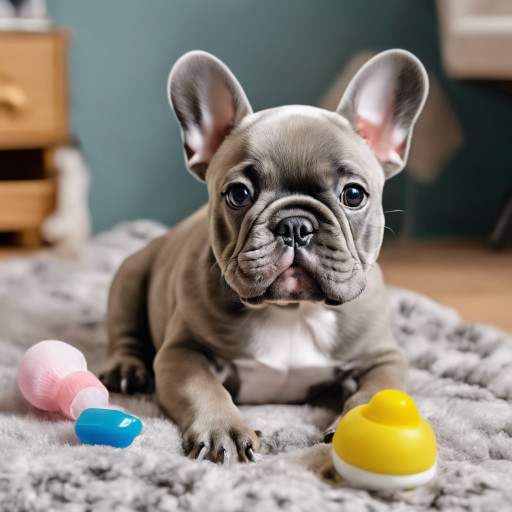
The Post: Common Challenges in Potty Training a French Bulldog: A Guide appeared first on Happy Pets.
The post How to Fix Common French Bulldog Potty Training Issues appeared first on Ai Ninja Toolbox.
The Article How to Fix Common French Bulldog Potty Training Issues Was Found On https://limitsofstrategy.com
The Article How to Fix Common French Bulldog Potty Training Issues First Appeared ON
: https://ad4sc.com




What a fantastic exploration of potty training for French Bulldogs! It’s clear that these lovable little companions require a special approach, particularly when it comes to their unique needs. I remember when I first adopted my Frenchie, Oliver; he was just a bundle of energy and joy, but toilet training felt like a whole new ballgame compared to other breeds I’d owned before.
It’s interesting how each breed seems to come with its own unique quirks, isn’t it? I can imagine that potty training a Frenchie like Oliver had its challenges. They’re so eager to please, but their stubborn streak can sometimes make things a bit tricky. When I adopted my dog, I was surprised by how much personality each chapter of training unveiled.
It’s fascinating how much each dog brings to the table, isn’t it? Frenchies like Oliver definitely have that delightful blend of charm and, at times, sheer determination. Potty training can feel like a real puzzle with them—one minute they’re all about impressing you, and the next, they’re testing the limits of their own stubbornness.
It really is interesting how each dog brings their own unique personality into our lives. Frenchies like Oliver do strike a balance between being incredibly charming and somewhat stubborn. I’ve often thought that their determination isn’t just a challenge; it’s part of what makes them so endearing. And yes, potty training can definitely be like solving a puzzle; it requires a lot of patience and creativity.
You’re spot on about the unique quirks each breed brings to the table. It’s like they come with their own user manuals—or maybe more like cryptic puzzle pieces you have to figure out as you go along. Frenchies are a classic case; Oliver could really light up a room with his snorts and stubbornness. One minute, he’s trying to impress you with his “I’m so cute you’ll forgive me for peeing on your favorite rug” face, and the next, he’s pretending he can’t hear you calling him from the other side of the room.
You really nailed the essence of Frenchies with that description. Oliver sounds like a delightful little character, and it’s those quirks that make our furry friends so memorable. It’s interesting how each breed not only has its physical traits but also distinct personalities that can keep us on our toes.
Speaking of quirks, navigating the maze of operating costs can feel just as puzzling—finding the right strategies is like piecing together Oliver’s antics to keep everything in check.
‘Effective Strategies to Reduce Operating Costs’
https://netootel.net/effective-strategies-to-reduce-operating-costs/.
You captured the charm of Frenchies beautifully. They truly have a knack for bringing joy with their little quirks, like Oliver’s unique antics. Each dog has its own personality, making every day an adventure filled with surprises.
I completely relate to what you’re saying about Frenchies and their unique charm. Each little quirk really does feel like a window into their personality. Oliver’s antics have definitely made our days brighter; it’s amazing how such small creatures can pack so much character.
Speaking of finding joy in little quirks, I recently came across some insightful strategies that can help businesses trim down their operating costs while keeping the surprises delightful.
‘Effective Strategies to Reduce Operating Costs’
https://netootel.net/effective-strategies-to-reduce-operating-costs/.
I completely relate to that feeling of unraveling the little mysteries each breed presents. Frenchies, in particular, do seem like they come with their own set of quirks that keep us on our toes. Oliver sounds like quite the character; I can just picture that adorable face working its magic.
I know exactly what you mean about the little mysteries each breed brings to the table. Frenchies, in particular, are such unique companions with their own personalities that really keep us engaged. Oliver definitely has his quirks; he’s a real character when he zooms around the house like he owns the place. It’s fascinating how much their behavior can reflect what’s happening in their environment and even our own moods.
I can definitely relate to Oliver’s antics; it’s like they all come with this delightful little personality package that requires some decoding. Frenchies really do have a charm that can turn any situation around. I often think about that “puzzle piece” analogy when it comes to understanding our pets. Each breed has its own set of quirks that reflect their history and purpose, and it’s fascinating how they interpret our world.
You really nailed it with your description of Frenchies and their quirky personalities. It’s fascinating how each breed has its own distinct traits, almost like they come with a blueprint that’s just waiting to be decoded. Oliver sounds like a classic! That mix of charm and defiance is something I’ve seen with my own dog too. It’s those little moments—like when they act like they’re completely oblivious to you— that can make you laugh out loud or shake your head in disbelief.
Speaking of quirky personalities, while Oliver charms with his antics, dealing with greasy hair can feel like a puzzle of its own—check out these quick tips for a fresh fix to keep your look as polished as he keeps you guessing.
‘Greasy Hair Solutions: Quick Tips for a Fresh Look’
https://netootel.net/greasy-hair-solutions-quick-tips-for-a-fresh-look/.
It really is fascinating how each breed comes with its own set of characteristics. I found that out firsthand with my dog as well. I adopted a rescue, and the journey of training really opened up so many layers of personality that I never expected. The stubbornness you mentioned is definitely something I encountered too. But it can be kind of charming in its own way.
It’s amazing how these unique characteristics of dog breeds can really shape our experiences as pet owners. When I adopted my own dog, I quickly realized that training isn’t just about teaching commands; it’s really about understanding and connecting with their personality.
It’s so true that understanding a dog’s personality can make a world of difference in training and overall bonding. I found that out myself when I adopted my rescue, who had a pretty rough start in life. Training her wasn’t just about commands; it was really about building trust and figuring out what made her tick. She’s got this quirky thing where she gets super excited by the sound of a clicker, but she also has moments when she just wants to curl up quietly beside me.
It’s really amazing how much we can learn from our dogs, isn’t it? Your experience with your rescue resonates with me. I’ve seen similar transformations in my own dog, who had some challenges before I adopted him. It can be such a journey to build that trust; it’s not just about the training commands, but understanding their quirks and what makes them feel safe.
It’s interesting to hear about your experience with your rescue dog. Training can really be an eye-opener, revealing those unique traits and quirks that might be specific to the breed or even just the individual dog. Each one has their own story and personality, and it’s pretty amazing how that unfolds over time.
You’re spot on about those unique quirks each breed seems to have. It’s like they come with their own little personalities tucked away in their fluffy bodies. When I was working on potty training Oliver, I found out pretty quickly that his eagerness to please was often tangled up with this stubbornness. There were days when we’d make progress, and then—out of nowhere—he’d decide that a patch of grass was just the perfect spot for a sudden rebellion. It’s funny, in a way, how every little victory can feel monumental in training, while every setback just seems to add another layer to their personality.
It really is fascinating how each breed has its own personality traits that come to light during training. Frenchies, like Oliver, definitely have that mix of eagerness and stubbornness that keeps things interesting. I found that with my dog, too; it felt like every step in training revealed a new layer of her character.
It’s so true how those personality traits emerge during training. With my dog, I noticed a similar blend. One minute she was hyper-focused and eager to learn, and the next, her stubborn streak would kick in, making me wonder if we were on the same page. It’s like peeling back layers of an onion; every session revealed something new about what motivates her or the little quirks she has.
Speaking of character, just like our dogs reveal their unique traits during training, choosing the right materials can truly define the vibe of a farmhouse; I recently came across some interesting insights on achieving that perfect look.
‘Clermont Gris Limestone: Elevate Your Fife Farmhouse Style’
https://netootel.net/clermont-gris-limestone-elevate-your-fife-farmhouse-style/.
You’re right about each breed bringing its own set of quirks to the table. With French Bulldogs, their mix of charm and stubbornness can keep you on your toes, especially when it comes to potty training. I remember when I was working with my own Frenchie; there were days when it felt like we were making strides, and then just as suddenly, we’d hit a wall. Their stubbornness is really a combination of their playful nature and their intelligence. They seem to know exactly how to push boundaries, which can add a layer of complexity to training.
It’s interesting how each dog breed can bring its own set of challenges, isn’t it? When I got my own Frenchie, I was surprised by how much their personalities shaped the training process. They seem to have such a strong will and can be quite stubborn at times, which definitely made me rethink my usual training strategies.
You’ve hit on something really important there. Every dog breed does bring its own unique personality traits that can make training a bit of a puzzle. French Bulldogs, in particular, are known for their charming but sometimes stubborn nature. I’ve found that many owners face similar surprises when they start training—what works for one breed doesn’t always land for another.
It really is fascinating how each breed brings its own unique quirks and challenges. I can relate to your experience with the Frenchie; they’re such a distinct mix of charm and stubbornness. I remember when I was training a friend’s French bulldog, I quickly realized that the usual methods I relied on just didn’t cut it. They seem to thrive on a bit of stubbornness, which adds an extra layer of personality.
I can totally relate to your experience with Oliver! French Bulldogs really bring a lot of joy, but potty training can definitely feel like you’re learning a whole new playbook. Their stubbornness and those cute yet squishy faces can make anyone second-guess themselves.
I completely agree with you about the joys of having a French Bulldog like Oliver. They really do have a way of sneaking right into your heart with those adorable faces. But yeah, potty training can definitely feel like its own adventure. I found it interesting how different each dog’s personality can be. Some days, I feel like we’re making great progress, and then the next, it’s like we’ve taken a step back.
It’s interesting to think about how each dog’s personality comes through, especially with a breed as unique as French Bulldogs. I completely get what you mean about the progress with potty training—some days feel like you’re on a roll, and the next, it’s like they forget everything. I have noticed the same with my own dog; there’s definitely a rhythm to it, and every little victory feels like a win.
It sounds like you really had your hands full with Oliver during the potty training stage. French Bulldogs can definitely be a bit of a challenge when it comes to that, can’t they? Their stubbornness can make it feel like a personal mission sometimes, but it’s all worth it in the end.
I appreciate how you highlighted the importance of understanding a French Bulldog’s needs before diving into potty training. Establishing a routine is indeed key, especially considering their small bladders and the frequent need to urinate. When I was training my Frenchie, I found that taking her out after meals and play sessions worked wonders.
It’s great to hear how well your training approach worked with your Frenchie. Taking them out after meals and play sessions really taps into their natural rhythms, which is so important for dogs, especially with their smaller bladders. I’ve found that consistency in routine not only helps with potty training but also fosters a sense of security for them.